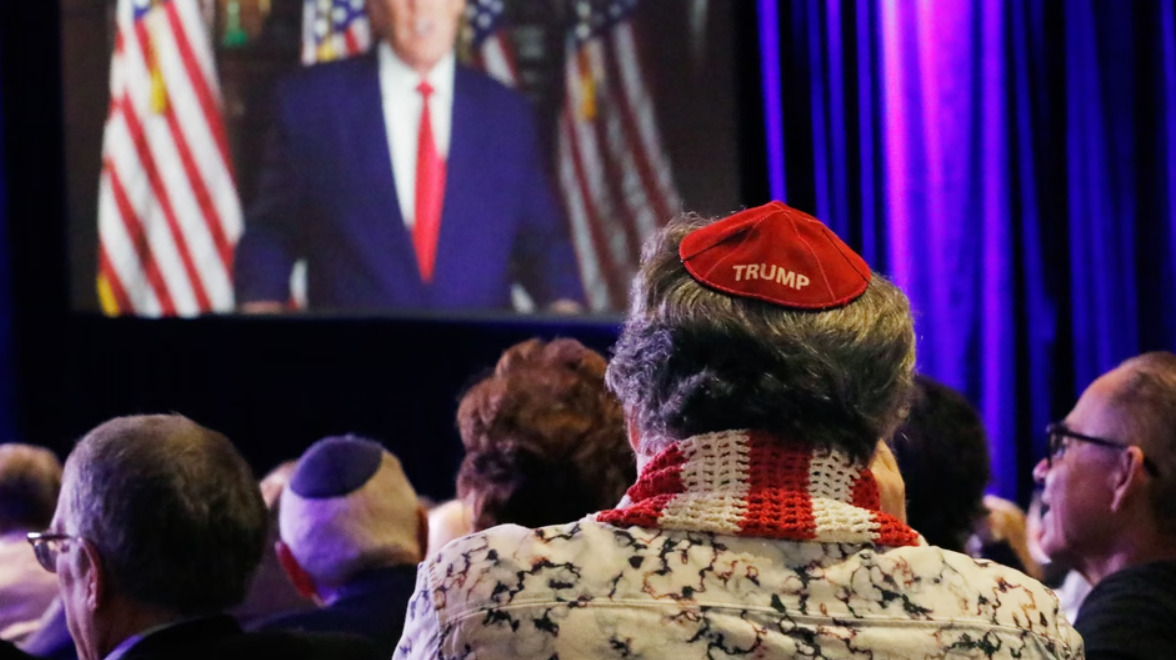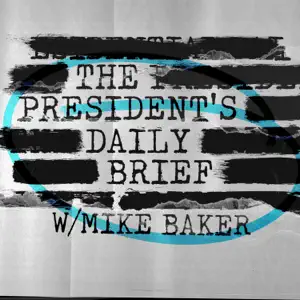
Time to end secret data laboratories—starting with the CDC
The American people are waking up to the fact that too many public health leaders have not always been straight with them. Despite housing treasure…
Thought Leader: Marty Makary

This piece is by WWSG exclusive thought leader, David Frum.
Donald Trump’s former longtime adviser Michael Cohen has said of the ex-president, whom he has likened to a Mob boss: “He speaks in code.” Trump used the code last week to send a warning to American Jews. “If I don’t win this election,” he said, “the Jewish people would have a lot to do with a loss.”
Flanked by American and Israeli flags, Trump delivered this warning at an event in Washington organized by the Republican mega-donor Miriam Adelson. He said he was speaking “very simply and as gently as I can.” As if to say: Nobody would regret it more than Trump himself if Trump supporters blamed Jews for stabbing him in the back—or, to put it another, even more familiar, way, if Trump supporters blamed Jews for nailing their Messiah to the cross.
Trump has often stereotyped Jews in unpleasant ways. His statements have characterized Jews as greedy, predatory, and dubiously loyal to the United States. Many American Jews resent Trump’s derogatory language about other groups as much as, or more than, the comments he has made about them. American Jews tend to highly value secularism, tolerance, respect, and equal dignity for all; Trump’s rhetoric as a candidate and his conduct in office offend on all counts.
Most American Jews also care about the security and well-being of the state of Israel. And, in contrast with his domestic record, Trump’s approach toward Israel when he was president was gratefully welcomed by the majority of American Jews.
It was President Trump who at long last moved the U.S. embassy in Israel to Jerusalem. It was Trump who gave the order to kill the leader of Iran’s elite Quds Force, Qassem Soleimani. It was Trump who accepted that, after 60 years of refusing to talk peace, the Syrians had forfeited their claim to the Golan Heights. It was Trump who negotiated with Arab governments that were ready to make peace with Israel: Bahrain, Morocco, Sudan, and the United Arab Emirates.
It was under Trump that Israel approached the normalization of relations with Saudi Arabia. And it was Trump who signed an executive order clarifying that calls for the destruction of Israel counted as anti-Semitism under federal civil-rights laws.
All of this may explain why Trump won nearly a third of the Jewish vote in 2020, more than any of his Republican predecessors. Since Trump left office, however, his movement has evolved in disturbing new directions.
The next generation of MAGA politicians and influencers is looking a lot more anti-Jewish and anti-Israel than Trump himself. That’s why his threat has so much bite. This explains how the Republican Party of North Carolina could nominate someone like Mark Robinson as its candidate for governor, fully aware of his long history as an anti-Semite and a Holocaust denier. But more conventional figures than Robinson also raise the alarm.
Conspiracism—the wellspring of anti-Semitic ideas—has become the dominant style of MAGA Republicanism. Trump made himself the effective leader of the GOP with the “birther” lie, an elaborate theory of how Barack Obama was born in Kenya, but his mother faked a birth certificate in Hawaii so that her son could run for president nearly half a century later.
The Trump presidency coincided with a crazy claim that a Washington, D.C., pizza parlor was the center of a child-sex-trafficking ring involving top Democrats. The claim incited a pro-Trump gunman to bring a rifle to shoot up the restaurant. Despite discharging three shots, the gunman mercifully surrendered to police without having injured anyone; he was sentenced to four years in prison. Some of the charlatans who spread the hoax remain honored players in Republican politics to this day. Trump’s own running mate, J. D. Vance, recently blurbed a book by one of them.
Vance deserves scrutiny in his own right. This week, he joined Tucker Carlson for an appearance in Hershey, Pennsylvania. Carlson had stirred controversy earlier in the month by hosting on his podcast an amateur historian who had a theory of World War II that presented the Holocaust as a terrible accident caused by the Nazis’ inadequate planning.
The real villain of the war, the historian argued, was Winston Churchill, because the British prime minister had refused to seek a compromise peace with Adolf Hitler. Carlson’s praise promoted the historian’s podcast to No. 1 in the iTunes store.
The intentionality of the Nazi Holocaust is about as well established as any fact in history. The writer most famous for denying it, David Irving, is an outright Nazi apologist who was exposed as a deliberate fraudster when he lost the libel suit he’d brought against the American historian Deborah Lipstadt. (It’s not an obscure story; there’s even a movie about the case.)
When Vance was asked whether he would still hold his planned event with Carlson after this bout of Holocaust denial, he dismissed the issue as “guilt-by-association cancel culture.”
But sometimes, association does prove guilt. That’s why the U.S. has laws against racketeering and membership in prohibited terrorist organizations.
Vance owes his prominence on the MAGA right in great part to his many appearances on Carlson’s former Fox News show. A voracious consumer of social media, Vance followed the amateur historian’s X feed from both his personal and his senatorial accounts.
The VP candidate presents himself as a strong supporter of Israel. In May, he delivered a speech to explain his reasons. For his venue, Vance chose the Quincy Institute, the Washington, D.C., think tank that numbers among its fellows John Mearsheimer and Stephen Walt, the co-authors of the 2007 book The Israel Lobby and American Foreign Policy.
The book explained U.S. support for Israel as the work of a nefarious combination of wealthy American Jews and their deceived Christian allies. Generally speaking, if you are trying to prove your bona fides to a skeptical Jewish audience, you avoid sharing platforms with people condemned by the Anti-Defamation League for engaging in “a classical conspiratorial anti-Semitic analysis invoking the canards of Jewish power and Jewish control.”
In his speech, Vance distinguished between Israel and other American allies he contemptuously dismissed as “clients … who can’t do anything without us.” He hailed the Israelis for their technological and military strength, which enabled them to “advance their interests on their own.” A strange thing about this argument, however, is that it cuts as much in favor of abandoning Israel as supporting Israel. If Israel doesn’t need help, why help it?
Indeed, that speech was delivered almost exactly a month after the collapse of Vance’s six-month fight to deny U.S. aid to both Ukraine and Israel. The House of Representatives approved the aid package on April 21. Two days later, Vance spoke from the Senate floor to give a different explanation of his position—one whose omission was as telling, in its way, as his later Quincy speech: Israel went unmentioned. Vance had many arguments against Ukraine, but not a word about the collateral damage to Israel.
In hindsight, Vance’s May speech looks less like a statement of deep conviction and more like a hasty cleanup of his record to quiet those criticizing him as a potential vice-presidential pick. But the choice of Quincy as the site of a “pro-Israel” speech appears strategic: Precisely because the think tank is headed by people hostile to Israel, he could count on not being troubled by awkward questions. At a pro-Israel conservative venue, such as the Hudson Institute or the American Enterprise Institute, his uncompelling argument might have faced more challenges.
Anti-Semitism itself is a conspiracy theory: a story about a tiny, malign group that masterminds world events, from the killing of Jesus to the creation of capitalism (and—never mind the contradiction—the spread of communism). Anti-Semitism differs in this respect from racism, xenophobia, misogyny, and homophobia.
Those other bigotries are founded on contempt. Anti-Semitism, like all forms of conspiracism, is founded on paranoia. Which is why people who start down any conspiracy-seeking path so often arrive at anti-Semitism. The pull is hard to resist, because the idea of Jews as arch-manipulators is such a powerful cultural resource.
The conspiracy seeker may start, for example, with the idea that Big Pharma is lying about vaccines. That’s not a specifically anti-Semitic form of paranoia. But as the conspiracy seeker delves deeper, the world begins to look like a series of secrets within secrets. Inside them all must lurk the ultimate boss. Who must that be?
John Buchan’s novel The Thirty-Nine Steps—a fiction steeped in paranoid conspiracism—gives the following words to one of its characters: “The Jew is everywhere, but you have to go far down the backstairs to find him.” That is the conspiracy seeker’s experience: always going down the backstairs, only to discover “the Jew.”
And that is a discovery reverberating louder and louder through MAGA world. As it does, it is echoed and matched on the far left by ancient libels repackaged as up-to-date academic theory. Karl Marx wrote of the continuing existence of a distinct Jewish identity as a problem and a mistake—and that one element of his ideology has fatefully outlasted the Berlin Wall.
Since the terror attacks of October 7, a shock of betrayal has jolted pro-Israel American Jews. Leftist opinion is hardening against Israel. Liberal opinion is softening in Israel’s defense. Many American Jews feel undefended and excluded, with supposed allies strangely inhibited and frightened to act with them.
In the liberal and progressive institutions where American Jews most expected to find solidarity and comfort, they have felt abandoned, even accused. Not all American Jews support every action of the Israeli government—and especially not the actions of the present Israeli government: A majority of American Jews feel little or no confidence in Israeli Prime Minister Benjamin Netanyahu.
But almost all American Jews did expect that their horror at the crimes of Hamas would be shared universally. They expected, too, a common understanding that Israel, like any state, would have no choice but to punish those crimes, rescue hostages, and act to prevent Hamas from ever repeating its terrorist atrocities.
Instead, within days of the terror attack and before any major military response, American campuses and other progressive spaces erupted in anti-Israel protests. As Franklin Foer observed in The Atlantic: “Impassioned support for the Palestinian cause metastasized into the hatred of Jews.”
Anti-Israel radicalism originated far to the left of mainstream liberalism and the national Democratic Party. But it seemed to many American Jews that mainstream liberals were unwilling to enforce institutional rules against such extremists.
All kinds of criminal mischief—blockading bridges, lofting balloons into the path of civilian airliners, excluding Jewish students from university facilities—were treated with strange indulgence by law enforcement or by university administrators who, at other times, tightly policed student conduct—for such trivial matters as offensive Halloween costumes. Only after intense disorder followed by public outcry did campuses start cracking down.
The far-left groups that organized these actions despised the Democratic leadership’s response to the crisis in the Middle East. Beginning in the first hours after the October 7 attacks, President Joe Biden provided more material and moral support to Israel than any U.S. president before him. Almost all leading national Democrats backed him.
Yet, outside the realm of elected politics, mainstream liberals have a harder time standing up to the anti-Israel left. In institutions of art and literature, in K–12 schools, and in progressive cities’ local governments, liberal-minded people retreat before anti-Jewish pressures. Whatever the MAGA movement has in mind for Jews, this progressive trend of hostility is the future, too.
To paraphrase Martin Luther King Jr., there is nothing surprising about the words of enemies. But there is something deeply disheartening and even frightening in the silence of once-trusted friends.
More conservative American Jews regarded Trump as one of those friends. Whatever else you say about him, he’s good on Israel. How often have I heard some variation of those words from American Jews who might otherwise have little regard for the ex-president? But beyond and after Trump, a powerful mood of anti-Semitism is growing on the American right, as my colleague Yair Rosenberg wrote recently. Trump’s message last week to his Jewish audience is that this mood will have his implicit sanction if he loses in 2024.
Time to end secret data laboratories—starting with the CDC
The American people are waking up to the fact that too many public health leaders have not always been straight with them. Despite housing treasure…
Thought Leader: Marty Makary
David Frum: How Harris Roped a Dope
This piece is by WWSG exclusive thought leader, David Frum. Vice President Kamala Harris walked onto the ABC News debate stage with a mission: trigger…
Thought Leader: David Frum
Michael Baker: Ukraine’s Faltering Front, Polish Sabotage Foiled, & Trump vs. Kamala
In this episode of The President’s Daily Brief with Mike Baker: We examine Russia’s ongoing push in eastern Ukraine. While Ukrainian forces continue their offensive…
Thought Leader: Mike Baker

